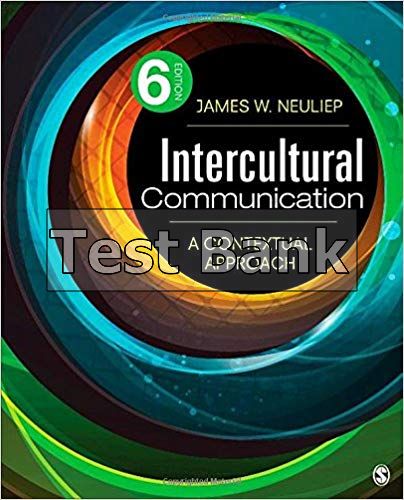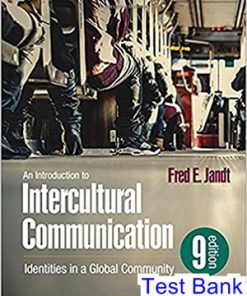Intercultural Communication A Contextual Approach 6th Edition Neuliep Test Bank

Product details:
- ISBN-10 : 1452256594
- ISBN-13 : 978-1452256597
- Author: James W. Neuliep (Ph.D., University of Oklahoma)
In this fully updated Sixth Edition of Intercultural Communication: A Contextual Approach, author James W. Neuliep provides a clear contextual model (visually depicted by a series of concentric circles) for examining communication within cultural, microcultural, environmental, sociorelational, and perceptual contexts. Beginning with the broadest context―the cultural component of the model―the book progresses chapter by chapter through the model to the most specific traits of communication― verbal and nonverbal messages. Each chapter focuses on one context and explores the combination of factors within that context, including setting, situation, and circumstances. Highlighting values, ethnicity, physical geography, and attitudes, the book examines means of interaction, including body language, eye contact, and the exchange of words, as well as the stages of relationships, cross-cultural management, intercultural conflict, and culture shock.
Table contents:
Chapter 1 • The Necessity of Intercultural Communication
The Need for Intercultural Communication
Human Communication
The Nature of Culture
The Study of Intercultural Communication
Fundamental Assumptions About Intercultural Communication
The Ethics of Intercultural Communication
The Goal: Intercultural Communication Competence
Chapter Summary
Discussion Questions
Developing Intercultural Communication Competence
Key Terms
Chapter 2 • The Cultural Context
Individualism–Collectivism
The Pancultural Self
High- and Low-Context Communication
Value Orientations
Power Distance
Uncertainty Avoidance
Long Term–Short Term Orientation
Chapter Summary
Discussion Questions
Ethical Considerations Within the Cultural Context
Developing Intercultural Communication Competence
Key Terms
Chapter 3 • The Microcultural Context
Microcultural Group Status
Muted Microcultural Groups
Microcultures in the United States
Chapter Summary
Discussion Questions
Ethical Issues and Microcultures
Developing Intercultural Communication Competence
Key Terms
Chapter 4 • The Environmental Context
Environments and Information Load
Culture and the Natural Environment
The Built Environment
Cross-Cultural Comparisons of Housing
Privacy
Monochronic Versus Polychronic Time Orientation
Chapter Summary
Discussion Questions
Ethics and the Environmental Context
Developing Intercultural Communication Competence
Key Terms
Chapter 5 • The Perceptual Context
Culture and Cognition
Stereotyping
Ethnocentrism
Chapter Summary
Discussion Questions
Ethics and the Perceptual Context
Developing Intercultural Competence
Key Terms
Chapter 6 • The Sociorelational Context
Dimensions of Group Variability
Role Relationships
Sex and Gender Roles Across Cultures
Chapter Summary
Discussion Questions
Ethics and the Sociorelational Context
Developing Intercultural Communication Competence
Key Terms
Chapter 7 • The Verbal Code
The Relationship Between Language and Culture
The Structure of Human Language
Elaborated and Restricted Codes
Cross-Cultural Communication Styles
Gendered Language Style Across Cultures
Language and Ethnic Identity
Chapter Summary
Discussion Questions
Ethics and the Verbal Code
Developing Intercultural Communication Competence
Key Terms
Chapter 8 • The Nonverbal Code
Definitions of Nonverbal Communication
Relationship Between Verbal and Nonverbal Codes
Channels of Nonverbal Communication
Nonverbal Communication and Dimensions of Cultural Variability
Nonverbal Expectancy Violations Theory
Chapter Summary
Discussion Questions
Ethics and the Nonverbal Code
Developing Intercultural Communication Competence
Key Terms
Chapter 9 • Developing Intercultural Relationships
Communication and Uncertainty
Anxiety/Uncertainty Management Theory of Effective Communication
Uncertainty Reduction and Intercultural Communication Apprehension
Empathy and Similarity in Relationship Development
Perceptions of Relational Intimacy Across Cultures
Intercultural Relational Maintenance
Mate Selection and Desirability Across Cultures
Chapter Summary
Discussion Questions
Ethics and Intercultural Relationships
Developing Intercultural Communication Competence
Key Terms
Chapter 10 • Intercultural Conflict
Definition of Intercultural Conflict
Intercultural Dialogue, Conflict Resolution, and a Culture of Peace
Face, Facework, and Conflict Communication Styles
The Intercultural Conflict Style Inventory
Individualistic and Collectivistic Approaches to Conflict
Conflict Resolution in High- Versus Low-Context Cultures
Resolving Cross-Cultural Conflict: A Contingency Model
Chapter Summary
Discussion Questions
Ethics and Intercultural Conflict
Developing Intercultural Communication Competence
Key Terms
Chapter 11 • Intercultural Communication in Business, Health Care, and Educational Settings
Intercultural Management
Management Practices Across Cultures
Culture, Intercultural Communication, and Health Care
Intercultural Communication and Educational Settings
Chapter Summary
Discussion Questions
Ethical Considerations
Developing Intercultural Communication Competence
Key Terms
Chapter 12 • Acculturation, Culture Shock, and Intercultural Competence
Acculturation
Culture Shock
Indicators of Success in the Intercultural Context
Intercultural Communication Competence
Chapter Summary
Discussion Questions
Ethical Considerations: Some Final Thoughts on Developing Intercultural Competence
Key Terms
Glossary
Notes
Index
People also search:
contemporary advertising 15th edition pdf free
global marketing management 8th edition
contemporary advertising and integrated marketing communications
marketing contemporary issues
marketing contemporary issues pdf free
Instant download after Payment is complete














